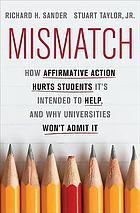
Mismatch
How Affirmative Action Hurts Students It's Intended to Help, and Why Universities Won't Admit It
کتاب های مرتبط
- اطلاعات
- نقد و بررسی
- دیدگاه کاربران
نقد و بررسی

October 15, 2012
Race-based admissions preferences at American universities actually harm the academic progress of the black and Hispanic students they are supposed to help, according to this eye-opening critique of affirmative action. UCLA law prof Sander and veteran legal journalist Taylor (Until Proven Innocent) draw on a wealth of research, including Sander's study of law schools, on the performance of "mismatched" students enabled by preferences to attend elite schools where their academic preparation is weaker than that of other students. The results, they contend, are dismal: mismatched students learn less, get lower grades, and are less likely to graduate or pursue majors in the sciences than if they had gone to less selective schools where teaching is geared to their academic backgroundsâand they feel correspondingly demoralized. Conversely, the authors offer striking data on the benign effects on black and Hispanic students of California's Prop 209, which banned the consideration of race, ethnicity, and sex in public institution admissions. Sander and Taylor present a lucid, accessible analysis of affirmative action in higher education and the groupthink enshrouding it, one that grapples with its failures while eschewing genetic determinism. Their well-argued challenge to the prevailing orthodoxy on racial preferences is sure to provoke controversyâand rethinking just as the Supreme Court hears an affirmative action case involving the University of Texas-Austin.

October 15, 2012
Sure-to-be-controversial take on race-based considerations of student need and institutional diversity. Affirmative action is one of those subjects, write Sander (Law/UCLA) and National Journal contributor Taylor (co-author: Until Proven Innocent: Political Correctness and the Shameful Injustices of the Duke Lacrosse Rape Case, 2007), that often cannot be raised without provoking shouting on one side, the other, or both. By their account, the practice of affirmative action--a form of preferential admission of minority candidates into institutions that receive federal funding, particularly colleges, as a means of combatting institutional segregation whether knowingly or unconsciously practiced--is harmful by virtue of purely unintended consequences. The "mismatch" of the title refers to an important one of those consequences: namely, the disorienting effect on the student of taking him or her from an underprivileged setting and making that student compete with students who have had all the advantages. The authors write that African-Americans from the lower-income brackets are more likely to enter college than are whites of the same socioeconomic level, thanks at least in some measure to affirmative action, but are far more likely to earn low grades, "rank toward the bottom of the class, and far more often drop out." The authors offer extensive data in support of their conclusions that the present system is not serving those students well, though they might have performed far better had they gone to nonelite schools. This information will be argued over all the same, but the authors' evenhanded suggestion that what might be a better strategy is to raise educational attainment by investing more in elementary and secondary education for lower-income students--"targeting economic need before racial identity," as they put it--seems unobjectionable on the face. The subject may be hard to talk about, but it must be, and this is a valuable contribution to opening that needed discussion.
COPYRIGHT(2012) Kirkus Reviews, ALL RIGHTS RESERVED.

























دیدگاه کاربران